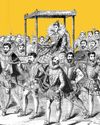
In the time of the Ancient Greeks and Romans, secret societies practised rituals, the knowledge of which has since been lost to time. These rituals, known as 'mysteries', continue to fascinate historians who seek to piece together disparate sources, from scant written accounts to evidence found at archaeological sites, in an attempt to further understand these fascinating cults. Professor Hugh Bowden of King's College London has spent many years studying Greek religion and to celebrate the release of his seminal work, Mystery Cults In The Ancient World, in paperback, he spoke to us about these groups, their various practices and the difficulties posed by researching something intended to remain secret.
In the introduction to your book, you define both the use of the word 'mystery' and the term 'mystery cult' in this context, could you just explain these definitions for the benefit of our readers?
The word 'mystery' originates from an ancient Athenian festival, the Eleusinian Mysteries, and in this context actually refers to a festival involving initiation. 'Mystery cult' is a modern term and can be an unhelpful one. For example, the Eleusinian Mysteries are a festival in honour of the goddess Demeter and her daughter Persephone (referred to in ancient times as Kore). And whilst initiation was important, there were lots of other activities that were just part of the worship of that goddess that were not particularly 'cult-like'. However, other cults like the Mysteries of Mithras involve meetings of small groups of initiates and in that sense is closer to what we would consider cult practices. So we don't use the terms 'mystery' or 'cult' quite in the way that we do in modern parlance, though there is some overlap.
Why were these separate groups linked under the mystery cults?
This story is from the Issue 133 edition of All About History UK.
Start your 7-day Magzter GOLD free trial to access thousands of curated premium stories, and 9,000+ magazines and newspapers.
Already a subscriber ? Sign In
This story is from the Issue 133 edition of All About History UK.
Start your 7-day Magzter GOLD free trial to access thousands of curated premium stories, and 9,000+ magazines and newspapers.
Already a subscriber? Sign In

STALIN HAD CONTINUED WEST AFTER BERLIN?
Having used the Allies for his own ends, the Soviet dictator plots to overthrow the rest of Europe

THE GLORIOUS FIRST OF JUNE
ATLANTIC OCEAN, 400 NAUTICAL MILES WEST OF USHANT 28 MAY - 1 JUNE 1794

LIFE AS AS A GODDESS
Jasmine Elmer uncovers the complexity and darker sides of ancient deities and delivers history with soul

TUDOR FASHION TIPS
From farthingales and ruffs to codpieces, ten ways to achieve the styles of the Tudor court

THE FIRST AMERICANS
Discover indigenous life before the colonists landed

THE LAVENDER SCARE
How a national fear of communism led to the American government outing and firing thousands of gay and lesbian workers

STARS BEHIND THE BARS
Ten iconic celebrity mugshots and the stories behind them

The Making of JAPAN
The rise of imperial power and a flourishing of the arts and culture in the Land of the Rising Sun can be traced back to the Asuka period

SIEGE OF TOULON
TOULON, FRENCH REPUBLIC SEPTEMBER-DECEMBER 1793

REDISCOVERING THE FORGOTTEN LIVES OF QUEER MEN
We speak to the editor of a groundbreaking new collection that uncovers what life was like for gay men when homosexuality was illegal in Britain